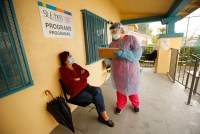Latest Morning Briefing Stories
A pesar del aumento de casos, California frena fondos multimillonarios para pruebas de COVID
El estado ya no financiará nuevos sitios de prueba, a pesar de las súplicas de los condados para obtener asistencia adicional. También ha cerrado algunos espacios y los ha trasladado a otros lugares.
As Cases Spike, California Pauses Multimillion-Dollar Testing Expansion
California is cutting off funding for COVID-19 testing just when counties say they need more resources in rural and disadvantaged areas.
‘More Than Physical Health’: Gym Helps 91-Year-Old Battle Isolation
For Art Ballard, the local gym was like his second home. The 91-year-old former jeweler relied on his near-daily workouts to stay healthy and for social interaction. But when California instituted its stay-at-home order, Ballard’s physical health suffered. So did his mental health.
Watch: Fauci, Other Health Officials Weigh California’s COVID Response
California Healthline’s Samantha Young helped lead a discussion about the state’s response to the novel coronavirus. Infections and hospitalizations are surging across the state.
Officials Seek To Shift Resources Away From Policing To Address Black ‘Public Health Crisis’
Local governments around the country are declaring racism a public health crisis. That could be lip service, or it might lead to shifting resources from policing to health care, housing and other services, experts say.
As COVID Cases Spike, California Shifts Its Strategy
Public health officials have been alarmed by the increase in COVID-19 cases linked to family gatherings and socializing. While Gov. Gavin Newsom is defending the state’s reopening, local health officials worry the situation could get worse this summer.
Sex In The Time Of COVID: Gay Men Begin To Embrace A ‘New Normal’
Like other people, many men who have sex with men have done all they could to avoid the coronavirus. Now some are braving renewed contact while balancing risk.
California Lawmakers Block Health Care Cuts
State legislators and Gov. Gavin Newsom have hammered out an agreement on a budget that rejects Newsom’s proposed cuts to health care services for older and low-income people.
Easy To Say ‘Get Tested.’ Harder To Do. Here’s How.
If you’ve been in a crowd — a protest or rally — experts have advice for figuring out whether you might have been exposed to the coronavirus, and where and when to get tested for it.
Doctor en Los Angeles ayuda a los manifestantes heridos y sin seguro de salud
El doctor Amir Moarefi posteó en Instagram que ayudaría a los heridos. Ha recibido cientos de pedidos y su posteo en Instagram fue compartido por grupos de protesta de todo el país.
Injured And Uninsured, Protesters Get Medical Aid From LA Doctor
A Los Angeles ophthalmologist’s offer on Instagram has ballooned into a loose network of physicians providing medical care to protesters who were injured while rallying against police brutality and racism. While clashes with the police have died down in some parts of the country, some protesters are seeking care for festering wounds from days-old injuries.
The Costs Of Safely Reopening A High-End Restaurant
The shifting federal guidelines about how to reopen during the pandemic have perplexed many small-business owners, including the Prestifilippos, who dug deep into their wallets to provide a new kind of dining experience they hope is safe.
Bibliotecarios y preparadores de impuestos serán detectives de COVID en California
Los bibliotecarios son perfectos para esta tarea: son curiosos, entienden la tecnología, y se relacionan bien con personas que apenas conocen.
California Hits Up Libraries and Tax Offices To Recruit 20,000 New Disease Detectives
As California begins one of the largest contact-tracing training programs in the country, many of the new recruits will be librarians: who are known to be curious, tech-savvy and really good at getting people they barely know to open up.
Citing COVID, Sutter Pushes To Revisit Landmark Antitrust Settlement
Six months after agreeing to a $575 million settlement in a landmark antitrust case, Sutter Health has yet to pay a single dollar and now says the terms may be untenable, given the strain caused by the pandemic.
At A Time Of Great Need, Public Health Lacks ‘Lobbying Muscle’
Public health officials are asking for more money in California’s state budget. But unlike some rich and powerful health care interests, they don’t have an army of lobbyists to curry favor with lawmakers.
Public Health Officials Face Wave Of Threats, Pressure Amid Coronavirus Response
Public health officials are confronting growing pressure — and threats — across the country as the backlash to the coronavirus response continues. At least 27 state and local health leaders have resigned, retired or been fired since April across 13 states.
COVID-19 Batters A Beloved Bay Area Community Health Care Center
Health clinics in isolated African American communities in the San Francisco Bay Area provide crucial services to neglected populations. But like thousands of other community clinics around the nation, their finances have been wrecked by the pandemic shutdown.
Using Stories To Mentally Survive As A COVID-19 Clinician
The practice of narrative medicine helps health care professionals hear the life stories behind a patient’s immediate complaints. Some doctors are finding that these skills also provide an alcove of needed reflection amid the pandemonium of COVID-19.
New Coronavirus Hot Spots Emerge Across South And In California, As Northeast Slows
Nationwide, coronavirus infection numbers are trending down, but several states are seeing upticks, with the heaviest impact falling on communities of color and nursing home residents.























